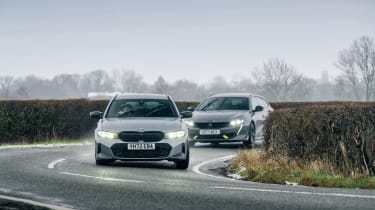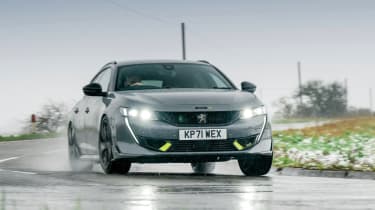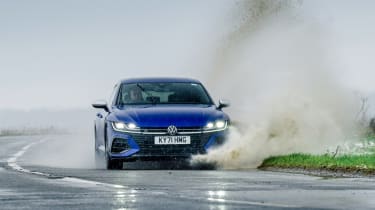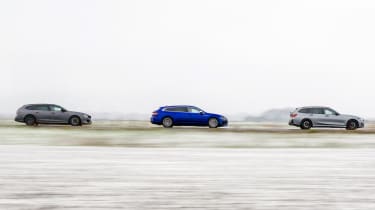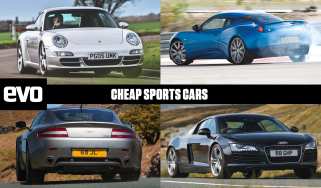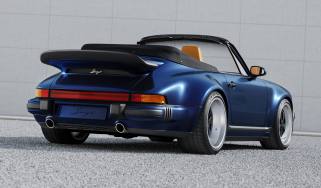BMW M340i xDrive v Peugeot 508 PSE v VW Arteon R Shooting Brake
Prefer a sleek estate to a jacked-up SUV but can’t stretch to an M3 Touring? This trio of alternatives could provide an answer
The rise and rise of the compact SUV is baffling. Every other car seems to be one, so it’s gratifying to learn that Europe is, in fact, still the biggest market for estate cars. It suggests that there are still many of us who recognise that a long, low estate car is not only more stylish and practical but also intrinsically more dynamic than a potato on wheels; the compact SUV is essentially a jacked-up saloon with a commensurately higher centre of gravity and all the dynamic compromises that brings.
There’s also something about a sporty estate that makes it cooler than the saloon it’s based on, so much so that you’d be tempted to go for the five-door even if you didn’t have dogs or bikes or kids’ paraphernalia to haul about. We’re huge fans of the current BMW M3 Competition but its desirability went through the roof when it was revealed in Touring form last summer, and it didn’t disappoint when we drove it, earning the full five stars.
The M3 Touring is arguably the ultimate sporty estate, but we can’t all afford £80k or more, and while most of us might want 503bhp we don’t need it. Question is, would the lesser M340i Touring do the job? Like the M3, it has a sonorous 3-litre, turbocharged straight-six and comes with four-wheel drive as standard, which seems sensible given that it’s not short of grunt: a generous 369bhp and 369lb ft of torque. It’s more affordable too, of course, at just over £60k before options.
More reviews
At this price it has rivals. First up is the Peugeot 508 PSE (Peugeot Sport Engineered), which costs £56,575 in SW (station wagon) form and is also four-wheel drive but in a novel way, with an electric motor on each axle to supplement the 1.6-litre turbocharged four. Fully charged, its motors boost the petrol engine’s 197bhp to 355bhp. Then there’s the Volkswagen Arteon R Shooting Brake, which costs £56,760 and has a 2-litre, turbocharged four that delivers a feisty 316bhp to all four wheels, this time via a specially tuned evolution of Volkswagen’s established, on-demand 4Motion system.
We’re big fans of the Peugeot’s looks. The French firm has always been clever at linking its road and competition cars by sharing design characteristics, and the 508 PSE carries this on with an obvious family resemblance to Peugeot’s WEC contender, the 9X8 hybrid hypercar. It’s there in the Selenium Grey paintwork, the ‘Kryptonite’ green highlights and the vertical slashes on the front end. The five-door 508 has some odd little bodywork details, but overall it looks tight and neat and sits perfectly on its 20-inch alloys.
It looks a bit bigger than the similarly de-chromed and grey BMW, here wearing optional 19-inch diameter wheels (18s are standard) that still look a bit weedy compared with the Peugeot’s 20s. Still, it’s another good-looking estate, the front end sharpened by a mild facelift last year that, happily, retained the small dual-kidney grille rather than gaining the M3’s challenging, buck-tooth version.
In optional, rich Lapis Blue and with a thin lightbar connecting the headlights, head-on the Arteon could be mistaken for the Golf R, but it’s a much bigger car. It’s slightly larger than its rivals here, too, with a softer profile and a longer rear overhang, and looks like the offspring of a Golf R and a Porsche Panamera. It offers the biggest boot space of our trio with the rear seats up, though there’s a step down and a step up when they’re folded, while the others offer flat floors. Seats down, the Peugeot is the most capacious, the BMW the smallest, but all three sporty estates offer generous rear seat room for six-footers.
BMW instruments have always been among the simplest and clearest, so we have mixed feelings about last year’s interior rework, which introduced the ‘Curved Display’: a single, massive screen incorporating new digital instruments and centre screen functions. The good news is there’s still a rotary switch and buttons on the centre console for navigating the myriad functions, but the diamond-pattern speedo and rev-counter are both unattractive and hard to read. Still, it’s easier to use than Volkswagen’s current HMI with its many haptic switches and frustrating logic. The Peugeot is a mixed bag, offering a simple row of toggle switches and a volume knob but then reflecting the complexity of its drivetrain in its digital instrumentation, which offers multiple versions of the dials, including, thankfully, a standard-looking display.
It pays to have read up on the hybrid 508’s various modes, accessed via a rocker switch on the centre console. The 1.6-litre four is willing and reasonably refined but you have to work it hard thanks to the battery pack and motors, which push the kerb weight close to two tons. It offers a small EV-only range of 26 miles, or in Comfort mode you can use the battery to boost throttle demands via the rear axle and get you going almost silently. To have the urge to match the BMW and Volkswagen you need to select Sport, because only then do both electric motors contribute and boost power to the full 355bhp.
The Peugeot feels like a different car in Sport mode, the throttle much sharper, the urge much stronger, while the shifts of the eight-speed auto ’box are more responsive and swifter. This higher state of alert seems to fit better with the 508’s dynamic character, too. Even in Comfort, the ride is quite robust and there’s a good deal of road noise as well, so with keener performance it feels more cohesive.
Some of the roads where we’re photographing the cars are challenging not just because they’re wet and it’s just above freezing but because they’re affected by subsidence. The Peugeot’s suspension is untroubled by the exaggerated hollows, dips and bumps though, its composure impressively resolute, and apart from a little front-wheel scrabble powering out of tight, wet junctions, the 508 gets all of its power down without fuss, which makes it highly effective cross-country. However, while you can select stronger regen braking on the overrun, if you’re using lots of performance on give-and-take roads, sooner or later you’ll exhaust the battery. You can force-charge it, making the engine run, but it’s inefficient and drains the tank quickly.
The BMW is a very mild hybrid, recouping energy on the overrun and braking, and storing it in a 48V battery. It then deploys it for smoother stop-starts and other electrical demands, so the alternator does less work and puts less load on the engine for better economy. You wouldn’t know it was there. You also wouldn’t know that the M340i was four-wheel drive until you start testing the traction, and even then it simply feels like a rear-drive car with phenomenal grip. What you can’t fail to notice and enjoy right from the off is the sweet drawl of the straight-six engine. The Peugeot’s in-line four is refined and quietly sporty but the BMW’s six is classy and cultured, sounding great at an amble and even better reaching for the red line. And it’s potent, too. The M340i is not a light car at almost 1800kg, but it’s a solid 80kg less than the 508 and delivers its massive torque smoothly and without lag.
It has better judged steering, too, with lighter efforts and more feel, while the ride has more compliance and a softer, low-speed edge. It can feel a little too free over some of the bigger events on these roads, but select Sport and the damping tightens up and delivers 508 levels of control. Perhaps best of all, from the driver’s seat you get the feeling that the masses are set up for rear-wheel drive, which, combined with the steering, gives the M340i a confidence-building sense of balance and agility that you can quickly convert into a satisfying flow. It therefore comes as a surprise that, when you disable traction and stability control, the rear tyres are very hard to unstick, even when the wipers are clearing sleet from the windscreen.
Of all the interiors, the Peugeot’s is the most stylish and of the highest quality, though the novel positioning of the instruments above the small, quartic steering wheel doesn’t work for all drivers, and straight after a regular round wheel, feels rather odd. The Volkswagen is somehow less expensive-looking than the other pair, its style a little plainer, its materials more ordinary, its detailing less generous.
Fire up the Arteon and its bigger-capacity in-line four is louder than the Peugeot’s and sounds gruffer, too. Open it up and there’s plenty of urge and a vaguely twin-cam-like brogue in the mid-range, but it’s a little coarse and there’s no aural reward for revving it out. Meanwhile, its seven-speed DSG isn’t quite as swift and keen as the autos in the other two. Dynamically, it trails the others, too. At low speeds its ride feels soft yet bumpy and on the same demanding stretch of road it gets wrong-footed even at a moderate pace. There’s one particular section with a bump followed by a compression that bears the scars of a number of engine sumps, and the Arteon gets within a whisker of adding to them. The M340i felt close, too, but coped much better in Sport mode. Although the Arteon R also comes with adaptive damping, even in its firmest setting it still feels under-damped here.
As such, it’s no surprise that there’s nothing special about the Volkswagen’s dynamics. Its steering feels unnecessarily weighty in turns taken at pace, and in slower, tighter corners there’s unexpectedly early understeer powering out. Sportier drive modes don’t seem to make much difference so you’re not encouraged to push through and see if the 4Motion system will send torque to the rear axle and eventually, if you’re really committed, elicit a bit of oversteer. After the other pair, which feel remarkably well hooked-up given the conditions, the Arteon feels distinctly average.
You can accept that the firmness and detail of the Peugeot’s town-speed ride is a trade-off for a remarkable degree of body control at speed. The 508 PSE is a weighty car, yet the way it absorbs bumps and maintains its composure on fast, flowing roads is remarkable. It has a poise that at times makes the pursuing M340i feel a little relaxed, and solid brake feel and stopping power too. For the full, rounded experience, you need to be in Sport mode with electrical drive from both axles and the keenest throttle response, and that’s not something you can guarantee with such a limited battery range. It’s a stylish estate too (you can have it without stickers on the turn-ups on each corner) with a handsome and well-built interior, and everything you see is standard. The only cost options are black or white paint and a panoramic glass sunroof.
By contrast, you can easily add a few thousand to the price of the BMW and Volkswagen; with special paint and a few trinkets this M340i adds up to £65,600 while this Arteon R is £64,700. As far as the Volkswagen is concerned, that’s an awful lot of money for a car with little charm. We’ve struggled to enjoy the Golf R and the Arteon R feels as underwhelming, with a potent but joyless engine and unresolved dynamics. Even more than the Golf, it feels as though it hasn’t been lovingly honed or lavished with attention. That pretty much goes for the whole car, with the result that the Arteon R is not engaging or exciting or desirable.
The M340i, on the other hand, is all of those things. There are a few minor downsides: the instruments are a little ugly, its lane keep assist is an over-sensitive blight on otherwise pure steering, and the Peugeot can teach it a thing or two about ultimate body control, too. Overall, though, the pitch of the BMW is pretty much spot-on and it sees off the challenge of the Peugeot, which in turn leaves the Volkswagen bobbing in its wake.
The M340i delivers a ride with decent low-speed suppleness and fine high-speed control thanks to effective drive modes and handling that’s involving and rewarding. You can enjoy and exploit the rear-drive balance with little risk thanks to four-wheel drive: leave DSC on and it sticks like Velcro, turn it off and in the wet you can balance it on a twist of opposite lock. In short, it’s a sporty estate with a well-judged bandwidth.
Then there’s the engine. There isn’t a four-cylinder powerplant that can match the classy character of the BMW’s 3-litre straight-six. It’s silky smooth and effortlessly torquey at low revs but if you pin the throttle it’ll deliver a massive kick and a thrilling top-end howl. Sure, the M3 Touring would drop it in a drag race but, really, how fast does your family wagon need to be? The M340i is handsome, too. Why would anyone choose a compact SUV when, to nick an advertising line from Jaguar, you could choose a load-lugger with grace, space and pace?
BMW M340i xDrive Touring
|
Engine | 6-cyl, 2998cc, turbocharged |
| Power | 369bhp |
| Torque | 369lb ft |
| Weight | 1795kg |
| Power-to-weight | 209bhp/ton |
| 0-62mph | 4.6-seconds |
| Top speed | 155mph |
| Basic price | £60,605 |
Peugeot 508 PSE
|
Engine | 4-cyl, 1598cc, turbocharged plus two e-motors |
| Power | 355bhp |
| Torque | 388lb ft |
| Weight | 1875kg |
| Power-to-weight | 192bhp/ton |
| 0-62mph | 5.2-seconds |
| Top speed | 155mph |
| Basic price | £56,575 |
VW Arteon R Shooting Brake
|
Engine | 4-cyl,1994cc, turbocharged |
| Power | 316bhp |
| Torque | 310lb ft |
| Weight | 1793kg |
| Power-to-weight | 179bhp/ton |
| 0-62mph | 4.9-seconds |
| Top speed | 155mph |
| Basic price | £56,760 |



